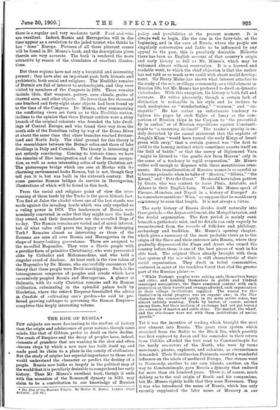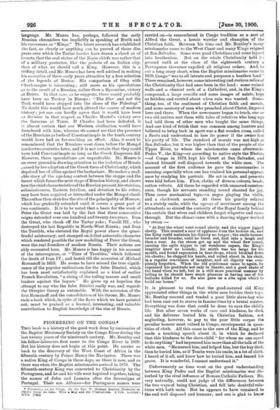THE RISE OF RUSSIA.*
PEW subjects are more• fascinating to the student of history than the origin and adolescence of great nations, though some minds, like that of Gibbon, prefer to dwell on their decline. The crash of Empires and the decay of peoples have, indeed, elements of grandeur that are wanting in the slow and often obscure steps by which a new race has built itself up, and made good its claim to a place in the comity of civilisation. But the study of origins has especial importance to those who would understand the character or predict the destiny of a people. Russia now bulks so largely in the political map of the worldthat it is peculiarly desirable to comprehend her early history. Thus Mr. Munro's excellent book, though it ends with the- accession of the Romanoff dynasty in 1613, may claim to be a contribution to our knowledge of Russian
• The Rise of the Russian Empire. By Hector H. Munro. London : Grant Richards. flOs. 6d.]
policy and possibilities at the present moment. . It is always well to begin, like the ram in the fairy-tale, at the
beginning, and in the case of Russia, where the people are singularly conservative and liable to be influenced by any - appeal to the past, this is peculiarly desirable. Hitherto there has been no English account of that country's origin and early history so full as Mr. Munro's, which may be welcomed almost without reservation. It is a learned and readable work, to which the chief objection is that the author has not told us so much as we could wish about social develop- ment. Sir Henry Maine has shown what interest attaches to
the study of the mir, or village community, as a vital element in Russian life, but Mr. Munro has preferred to dwell on dynastic
vicissitudes. With this exception, his history is both full and accurate. He writes pleasantly, though a certain lack of distinction is noticeable in his style and he inclines to such neologisms as " wanderlusting," " warmon," and " un- stayable." He has rather an unfortunate tendency to lighten his pages by such flights of fancy as the com- parison of Russian ships in the Caspian to "the proverbial fly in amber," or of Russian expeditions against Constanti- nople to "a recurring decimal? The reader's gravity is un- duly disturbed by the casual statement that the exploits of Jenghiz Khan "would have turned the early Kings of Israel green with envy," that a certain general was "the first to yield to the homing instinct which sometimes asserts itself on the field of battle," or that the mercy of Sigismund Vasa "might be likened to the gentle dew from Heaven' only in the sense of a tendency to rapid evaporation." Mr. Munro writes well enough to dispense with these meretricious orna- ments. His transliteration of Russian names is so careful as to become pedantic when he talks of "Moskva," " Sibiria," "the Kreml," and "Pete the Great." He should have taken pattern by Grote, who was content to leave Plato, Aristotle, and Athens in their English form. Would Mr. Munro speak of Firenze, Munchen, and Napoli in a history of Europe ? As he somewhere mentions" Wien," we suppose that he would carry cuasistency to even that length. It is not always a virtue.
The early history of Russia divides' itself naturally into three periods,—the Aryan settlement, the Mongol invasion, and the feudal organisation. The first period is mainly sunk beneath a prehistoric mist, and its details can only vaguely be reconstructed from the records of folk-lore and philology, archmology and tradition. Mr. Munro's opening chapter, which gives a summary of the most probable views as to the origin of the Slays and their entrance into Russia, where they
gradually dispossessed the Finns and Avers who owned the country before them, is one of the best pieces of -work in his
able book. The original -Slays already brought with them that system of the mil. which is still characteristic of their social organisation. They dwelt in tribal communities, scattered in oases of the trackless forest that clad the greater part of the Russian plains :— • •
"While Teutonic peoples were raising unto themselves burgs and cities, and banding themselves in guilds and kindred municipal associations, the Slays remained content with such protection as their forests and swamps afforded, such organisation as their village institutions supplied. The reason for this limitation in social progress was an organic one ; in the Slav character the commercial spirit, in its more active sense, was almost entirely wanting. Trade by barter, of course, existed among them, but their medium of exchange had not got beyond the currency of marten and sable skins. The market, the wharf, and the storehouse were not with them institutions of native growth."
Yet it was the incentive of trading which brought the next
new element into Russia. The great river system which stretched from the Baltic to the Black Sea, which possibly was first explored by Jason and his comrades in their return from Colchis, afforded the best road to Constantinople for the hardy sea-rovers of the North, who were by turns merchants; pirates, explorers, and colonists, as circumstance demanded. Their Scandinavian Peninsula exerted a wonderful influence on the whole of mediaeval Europe. One stream went to Normandy, another to our own islands, another, on the way to Constantinople, gave Russia a dynasty that endured for more than six hundred years. There is, of course, much
dubiety as to the real origin of Rurik and his companions, but Mr. Munro rightly holds that they were Norsemen. They.
it was who introduced the name of Russia, which has only recently supplanted the later name of Muscovy in our
language. Mr. Munro has, perhaps, followed the early Russian chroniclers too implicitly in speaking of Tharik and his successors as "Kings." The latest research has established the fact, as clearly as anything can be proved of those dim years over which the Tartar hordes have drawn a cloud as of locusts, that the real status of the Norse chiefs was rather that of a military protector, like the podesta of an Italian city, than of what we should call a King. However, this is a trifling detail, and Mr. Munro has been well advised in making his narrative of these early years attractive by a free selection of the legends of Nestor. His comparison of Oleg with Charlemagne is interesting; still more so his speculations as to the result of a Russian, rather than a Byzantine, victory at Dristr. In that case, as he suggests, there would probably have been no Turkey in Europe: "The Slav and not the Turk would have stepped into the shoes of the Paleologi." No doubt this would have much altered the course of modern history ; yet one can hardly agree that it would have been as decisive in that respect as Charles Martel's victory over the Saracens at Tours. If Charles bad been defeated, it 15 almost certain that our Western civilisation would have foundered with him, whereas -de cannot see that the presence of the Russians as lords of Constantinople in the tenth century would have had so far-reaching an effect. Also, it must be remembered that the Russians went down before the Mongol hordes two centuries later, and it is not certain that they could have held Constantinople so long as the Greek Emperors did. However, these speculations are unprofitable. Mr. Munro is on surer ground in drawing attention to the isolation of Russia caused by her adoption of the Greek form of Christianity, which deprived her of allies against the barbarians. He makes a read- able story of the age-long contest between the steppe and the forest which forms the next stage of Russian history, and shows how the chief characteristics of the Russian peasant, his stoicism, submissiveness, Eastern fatalism, and devotion to his rulers, may have been acquired or intensified under the Mongol cloud. The author then sketches the rise of the principality of Moscow, which has gradually extended until it covers a great part of two continents. It is to be noted that a basis for the work of Peter the Great was laid by the fact that three consecutive reigns extended over one hundred and twenty-two years. Ivan the Great, who shook off the Tartar yoke; Vassili Ill., who destroyed the last Republic in North-West Russia; and Ivan the Terrible, who elevated the Royal power above the quasi- feudal aristocracy, and stamped on it that autocratic character which rendered possible the new modelling of Peter the Great, were the real founders of modern Russia. Their actions are ably recounted here. Mr. Munro is less happy in his account of the interregnum, or "Time of Troubles," which followed the death of Ivan IV., and lasted till the accession of Michael Romanoff in 1613. He seems to have missed the true signifi- cance of the popular enthusiasm for the false Dimitri, which has been most satisfactorily explained as a kind of earlier French Revolution, "a rising of the toiling masses and small traders against the boyars." He gives up as hopeless the attempt to say who the false Dimitri really was, and regards the Otrepiev theory as untenable. With the accession of the first Romanoff and the consolidation of his throne, Mr. Munro ends a book which, in spite of the flaws which we have pointed out, must be praised as a learned, interesting, and valuable contribution to English knowledge of the rise of Russia. '



















































 Previous page
Previous page